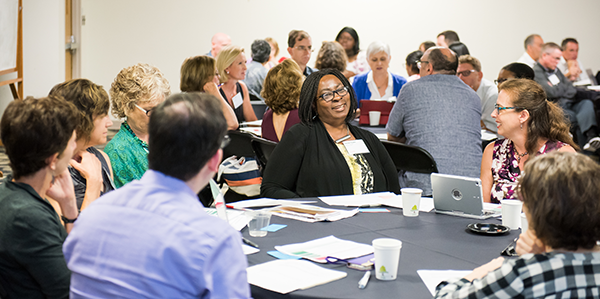2017 Retreat Focuses on Strategic Plan Implementation
Summary of 2017 University Retreat

Nearly 250 UMBC faculty, staff, students, and alumni gathered on campus August 23 to learn about and discuss how the University and its colleges and divisions are pursuing initial priorities for implementation of Our UMBC: A Strategic Plan for Advancing Excellence.
President Freeman Hrabowski opened the retreat by welcoming top leaders of the University System of Maryland (USM), the University of Maryland Baltimore, and UMBC’s Alumni Association, including USM Chancellor Bob Caret. Amid praise for UMBC, the Chancellor cited the need for every USM institution to focus more aggressively on student success or risk losing the support of the State’s political leaders.
President Hrabowski noted that since last year’s retreat, the University had passed the final stage of accreditation from the Middle States Commission on Higher Education with flying colors. The Middle States review team not only commended UMBC for tightly integrating its financial planning with its goals, the reviewers found that the University met the Commission’s standards at such a high level that not a single recommendation was required. That success is impressive, the president said, but not a reason to be complacent. Rather, the well-aligned goals for academics, enrollment, research, and finances that impressed the Middle States reviewers provide a foundation for new achievements and the future of our community.
A video recapped the community process through which the strategic plan developed, highlighting the University’s vision statement and its roots in UMBC’s enduring commitments to inclusive excellence, student success, and the integration of teaching, research and civic engagement.
Provost Rous reviewed the first priorities for each of the four focus areas of the strategic plan: The Student Experience; Collective Impact in Research, Scholarship, and Creative Achievement; Innovative Curriculum and Pedagogy; and Community and Extended Connections. The Provost also introduced a draft implementation dashboard that tracks University-level activities, commitments, and investments made in support of those priorities over the fiscal years 2017-2020. “Our primary aim was to create a dashboard that is available to every member of the community, that is concise and easy to understand, and provides sufficient information to track progress toward strategic goals and objectives,” he explained.
Participants discussed the draft dashboard in groups and responded individually to a prompt about its clarity and usefulness, entering comments that can be viewed on digital forms. Feedback was collected in this manner several more times during the retreat, creating a record of responses that will be reviewed by University leaders and available to members of the community. Responses to the dashboard query are here.
Lynne Schaefer, vice president for administration and finance, provided a look at the FY 2018 budget, while Greg Simmons, vice president for institutional advancement, described the themes and scope of the just-launched Campaign for UMBC.
Participants adjourned from the plenary session to attend back-to-back breakout conversations about initiatives in the colleges and divisions that address strategic plan goals. After hearing about the work, they were asked to individually reflect on the initiatives. (The comments from the two breakout sessions are here.)
The entire group again came together again to consider how UMBC’s cultural strengths could be enhanced to further the University’s mission. The session was facilitated by Jack Seuss, vice president for information technology, and Gib Mason ‘95, executive director of the Center for Leadership and Innovation at the UMBC Training Centers. Polled digitally, participants named diversity followed closely by shared governance as the most important strengths for helping UMBC achieve its strategic goals. Discussion groups said that the diversity-promoting practices already in place could be complemented by recognition of more kinds of diversity and programs helping community members have “authentic conversations and relationships across difference.”
Gathered next in the Linehan Concert Hall, participants explored the inclusive excellence and social justice elements of the UMBC vision statement through two panels moderated by Kimberly Moffitt, Faculty Senate president and associate professor of American studies and language, literacy and culture. The first panel featured three outside experts:
Eugene Anderson, vice president of the Association of Public and Land-grant Universities
Joann Boughman, senior vice chancellor, Academic and Student Affairs, USM
Scott Jaschik, editor, Inside Higher Ed.
The panelists shared perspectives about how the current political and social climate affects inclusion and diversity initiatives on campuses.
The second panel was comprised of UMBC community members:
Sean Bhatia ‘18, statistics
Cedric Herring, professor and director, language, literacy, and culture
Ana Maldonado ‘18, human services psychology
Christopher Murphy, professor and chair, psychology
Valerie Thomas, chief human resources officer.
The panelists discussed the work they were doing to advance diversity and inclusion on (and in some cases, off) campus. Participants also had a first look at UMBC’s new website for diversity and inclusion, unveiled by Candace Dodson-Reed, assistant vice president, community and public affairs.
The day continued with participants reflecting on “Inclusive Excellence + Baltimore” as faculty and students from two departments, visual arts and language, literacy, and culture, presented their Art of Transformation public media project. Bev Bickel, clinical associate professor of language, literacy and culture, introduced the project, which aims to document and catalyze transformation in Baltimore through cultural means. The discussion included the showing of a short film by Chris Kojzar, MFA ‘18, intermedia and digital arts, about the project and the creative connections faculty and students have made with Baltimore communities.
(A video of the panels and the presentations is here.)
Del. Adrienne Jones ‘76, speaker pro tem of the Maryland House of Delegates, joined President Hrabowski and Provost Rous for wrap-up remarks before a late afternoon social hour. Responding to the presentations about inclusive excellence she noted, “The stakes have rarely been higher for inclusive excellence in our state and nation -- and I am so proud that my university is leading the way.”
Posted: September 19, 2017, 4:05 PM